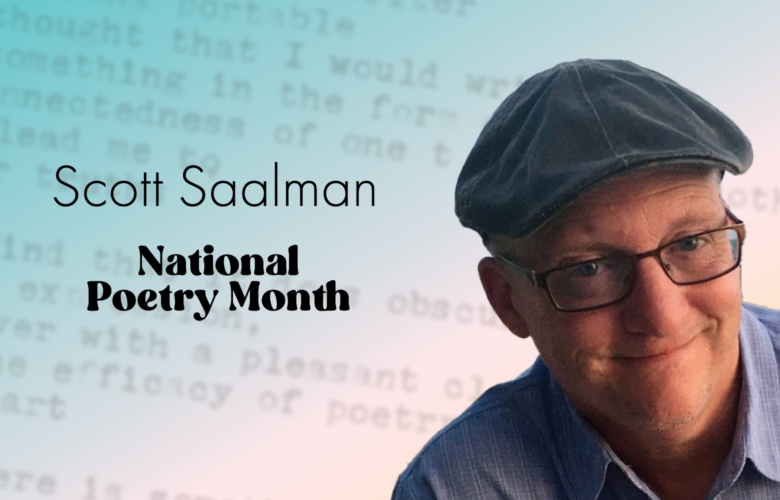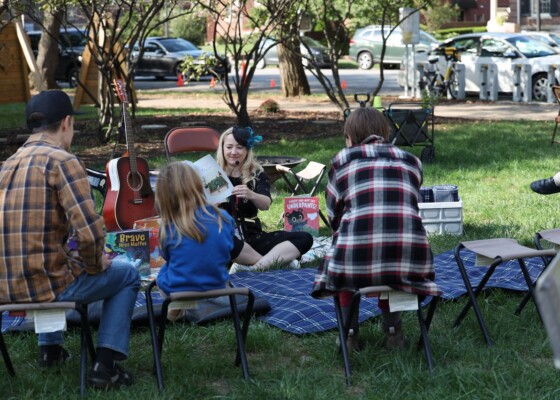National Poetry Month — Scott Saalman
April 16, 2022Last year, in honor of National Poetry Month, I asked several past Indiana Poets Laureate their thoughts about the importance of Amanda Gorman’s inauguration poem to the revitalization of American…
Last year, in honor of National Poetry Month, I asked several past Indiana Poets Laureate their thoughts about the importance of Amanda Gorman’s inauguration poem to the revitalization of American poetry and to the health of the nation. This year I decided to pose a larger question to four Hoosiers working outside the field of poetry. I asked:
How do the Humanities help us all cultivate hope and community in times of crisis?
Here is the second response from Scott Saalman, a freelance columnist and essayist.
Matthew Graham
Indiana Poet Laureate
During the very surreal early weeks of the Great Global Pause, while social distancing from my long-distance new wife, I found free time to reread Irving Stone’s The Agony and the Ecstasy, a thick paperbackpurchased from a Florence bookstore a few years earlier. Once again, I became blessedly lost in this biographical novel, and although it was set during the turbulent Renaissance and read at a very hysterical time in the present, there came from its passages a sense of solace, a salve for the soul, as I bobbed for paragraphs from the past to escape the now, to briefly forget that just outside the closed and deadbolted front door of my hermetically sealed house, something invisibly wicked our way had indeed come.
I’m just a silly humor newspaper columnist. It’s questionable that my work even qualifies as fitting within the humanities realm, as if I’m destined to always be on the outside looking in at the great. Still, I take the crafting of each column’s paragraph as seriously as history tells me Michelangelo likely took each brush stroke that he applied to the Sistine Chapel. Granted, his frescoes completed near the end of the Middle Ages illustrated the “pre-history of salvation” whereas my columns illustrate such unweighty subjects as the scourges associated with my own middle age in the form of nose hairs gone wild.
As a writer, during the first months of the pandemic, I used my alleged humor to, temporarily at least, keep things light for my readers during the heavy times, provide a ray of light in the dark days. Through words, I hoped to serve as some sort of social distancing companion — just as Irving Stone did for me. In our remoteness, togetherness can come.
That my mother was dying of stage four colon cancer during this time provided me with a double whammy of seemingly inescapable reality and horror. She was my biggest (and arguably only) fan, so I wanted to make her laugh as often as possible (usually at her own expense, which she loved). At a time when everyone struggled to mentally process the pandemic, I wrote: “Mom first acted as if she were invincible in the face of COVID-19. ‘I survived having a portion of my colon removed, 60% of my liver removed and countless rounds of chemo and radiation. This virus is nothing. All people really need to do is eat Campbell’s chicken noodle soup if they feel bad.’ Campbell’s chicken noodle soup has always been her go-to solution for family ailments. I think she’s convinced that it also played a role in the polio vaccine. If Dad ever, God forbid, accidentally cut off his hand down in his machine shop, she would likely bypass 911 and simply heat up a can of soup for him. The empty can, itself, could then double as an artificial hand. I envisioned a great wall made of stacked Campbell’s soup cans positioned around the perimeter of their property. Their anti-COVID wall.”
Readers emailed me thanks for providing small doses of levity during our most dangerous of times. Even my own dad reported tears of joy, this from a man watching his wife of more than 50 years slowly fade away. I embraced my part in helping a small, unseen, community of readers briefly forget about their worries, and, in essence, collectively whistle past the graveyard. The work applied took my mind off the terrible times too.
Getting lost in a poem, a serious story, a silly story, demonstrates how the humanities provide comfort, coherence, healing and hope while the world burns and churns around us.
Historically, the humanities have provided humankind a chance to escape the hard times.
I find the act of escape to be a virtue, for escaping something implies that one possesses the will to both hope and strive for better days ahead.
To all poets and writers — and yes, fellow humor columnists — please keep adding your unique threadwork to the cultural fabric of society. The talent — and for some, the genius — with which you have been gifted can forge togetherness, create community and foster hope for humanity.
True, the world is a big mess now, and yes, we torch bearers of the humanities are likely to be no better off than the doomed players of the dance band on the Titanic, but still we must play on, especially now we must play on. Nearer, my God, to Thee.



